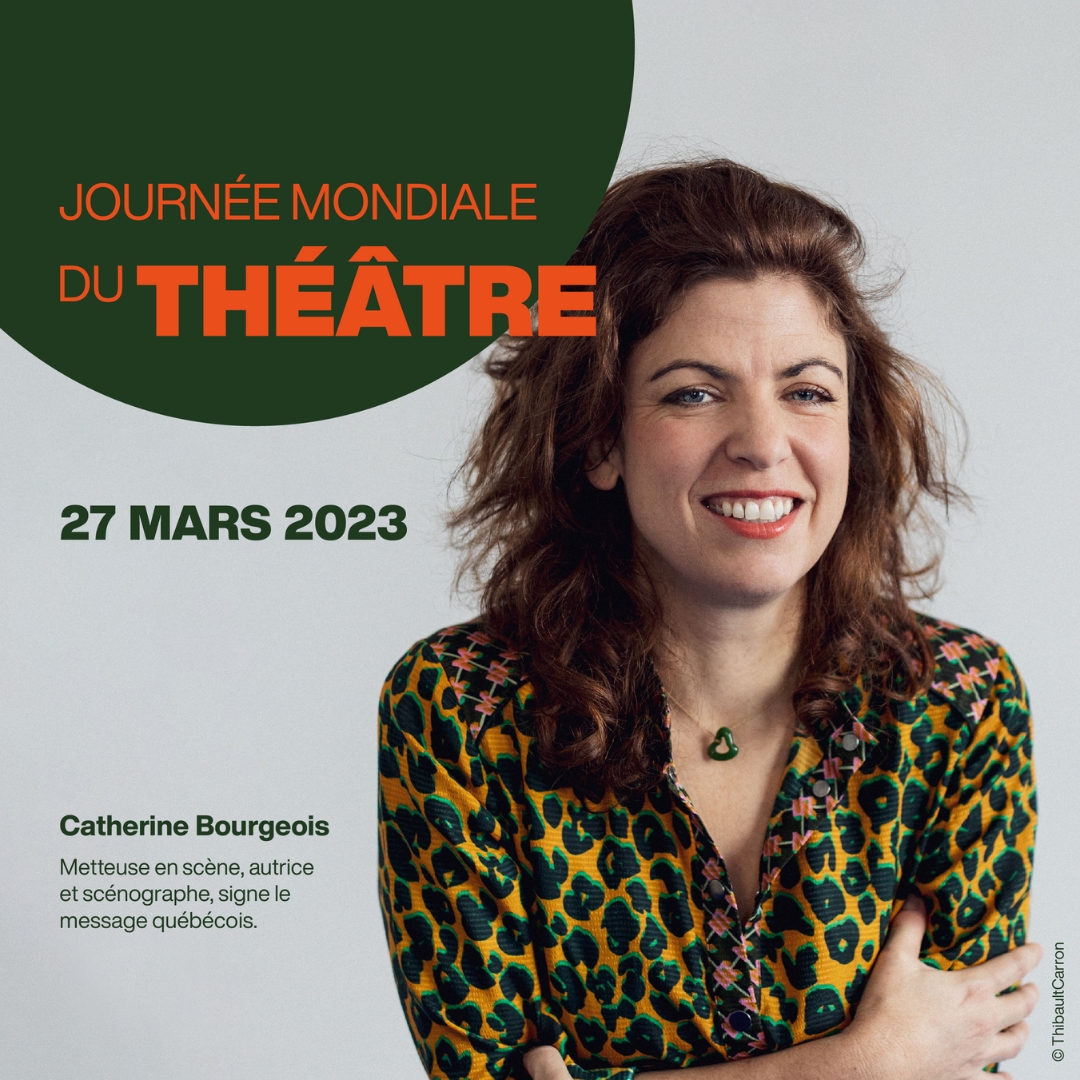Catherine Bourgeois, autrice du message québécois du théâtre 2023
23 mars 2023 |
PARTAGER :


Message québécois pour la Journée mondiale du théâtre
Par Catherine Bourgeois
----------
A Message for World Theatre Day 2023
I’ve been thinking a lot about impermanence recently. The impermanence of things and humans, obviously, and especially our collective impermanence. I’ve been wondering too about the permanence of theatre—that millennial art, the art of presence, which is slowly picking itself up after the blow the past three years have dealt.
(Im)permanence makes me think of Truva, a Turkish city on the Aegean Sea. Truva is a city of ruins, but it’s had nine lives. It’s better known as Troy, a city that for the longest time I thought was actually fictional. During a recent trip to Turkey, as I walked among the mythological ruins, each step deepened my confusion: if Troy existed, did Priam, Paris, and Helen once tread on this same soil? I continued my journey along the Aegean in that sweet ambivalence between truth and fiction, unsure whether I should google Priam. I did not; Priam and the gang remained afloat, hovering between myth and history. There’s something serene about a mystery like that: history doesn’t matter, as long as there’s a story.
Life taught me the value and the power of stories a few years ago when a loved one disappeared, and was never found. What I missed most wasn’t the body—the inanimate remains, the flesh gone stiff—but the story of that sudden end, the lack of a story I could tell (myself) to dispel the mystery of death. That was when I understood, deep within myself, that we are storytelling creatures, homo fabulator, and that we need to invent and narrate ourselves through fiction.
Faced with the looming end of the world, which every day becomes increasingly, alarmingly concrete, I sometimes think about how pertinent theatre seems as a narration of the impermanence of life. Among the ruins of what society will we rebuild ourselves through art in one year, one hundred, three thousand years? For our stories to survive longer than we will (and perhaps for theatre to survive at all), our practice must absolutely and immediately be founded on principles of equity, representation, and ecological responsibility.
In our ephemeral world, it is theatre’s pertinence that will ensure its permanence. This is the art that represents us, that defines and forges. It thrums with such intensity in whatever weaves us, body and voice, on the sidewalk or the gymnasium floor, under the lights, with sets and sound… even if, or indeed because it is destined by its very nature to flame out after three weeks or a couple of tours, a few hundred shows at most. Theatre is a living art that dances with death. The art of fiction, which lies to better tell the truth.
Depuis quelques temps, je pense souvent à l’impermanence. L’impermanence des choses et des humains, bien sûr. Et notre impermanence collective surtout. Puis je me questionne sur la permanence du théâtre : un art millénaire, un art de la présence qui se relève lentement du récent KO.
L’(im)permanence me fait penser à Truva. Une ville turque qui donne sur la mer Égée. Une ville en ruines, qui a pourtant eu neuf vies. Une ville que nous connaissons sous le nom de Troie et que je pensais fictive jusqu’à tout dernièrement. Lors d’un récent voyage en Turquie, en marchant sur ces ruines mythologiques, chaque pas me rendait plus confuse : si Troie avait existé, Priam, Paris et Hélène avaient-ils également foulé cette terre? Dans une douce confusion entre fiction et vérité, j’ai poursuivi mon périple le long de la mer Égée, ne sachant trop si je devais googler Priam ou non. Je ne l’ai pas fait. Priam et sa bande demeurent donc flottant entre mythologie et histoire. Ce mystère me rend sereine : peu importe l’Histoire, tant qu’il y a une histoire.
La valeur et la grande puissance de l’histoire, la vie me les a enseignées il y quelques années, lorsqu’un être cher a été porté disparu, puis jamais retrouvé. Ce n’est pas le corps, la dépouille inanimée et la chaire raidie, qui m’ont le plus manqué, mais l’histoire même de sa fin subite. Le manque d’une histoire à (me) raconter, afin de dissiper le mystère de la mort. J’ai ainsi compris, au plus profond de moi, que nous sommes des êtres d’histoire, une espèce fabulatrice qui a besoin de s’inventer et se dire par la fiction.
Devant l’évidence de la fin du monde, qui se manifeste chaque jour avec une concrétude de plus en plus alarmante, je réfléchis parfois à la pertinence du théâtre pour raconter cette impermanence de la vie. Sur les ruines de quelle société devra-t-on se reconstruire artistiquement, dans un an, cent ans, trois mille ans? Pour que nos histoires nous survivent (et peut-être pour que le théâtre survive, point), ce sont les principes d’équité, de représentativité et d’écoresponsabilité qui doivent impérativement, dès maintenant, guider notre pratique.
Ainsi, dans notre monde éphémère, c’est par sa pertinence que le théâtre assurera sa permanence. Celui qui nous représente, définit et forge. Celui qui palpite intensément dans tissus, corps et voix, sur plateaux, trottoirs ou terrazzo, sous lumières, sons et scénographies… même s’il est voué – ou parce qu’il est voué, de par sa nature même, à mourir soudainement après trois semaines, quelques tournées ou tout au plus quelques centaines de représentations. Un art vivant qui valse avec la mort. Un art de fiction, qui dit la vérité en mentant.
L’(im)permanence me fait penser à Truva. Une ville turque qui donne sur la mer Égée. Une ville en ruines, qui a pourtant eu neuf vies. Une ville que nous connaissons sous le nom de Troie et que je pensais fictive jusqu’à tout dernièrement. Lors d’un récent voyage en Turquie, en marchant sur ces ruines mythologiques, chaque pas me rendait plus confuse : si Troie avait existé, Priam, Paris et Hélène avaient-ils également foulé cette terre? Dans une douce confusion entre fiction et vérité, j’ai poursuivi mon périple le long de la mer Égée, ne sachant trop si je devais googler Priam ou non. Je ne l’ai pas fait. Priam et sa bande demeurent donc flottant entre mythologie et histoire. Ce mystère me rend sereine : peu importe l’Histoire, tant qu’il y a une histoire.
La valeur et la grande puissance de l’histoire, la vie me les a enseignées il y quelques années, lorsqu’un être cher a été porté disparu, puis jamais retrouvé. Ce n’est pas le corps, la dépouille inanimée et la chaire raidie, qui m’ont le plus manqué, mais l’histoire même de sa fin subite. Le manque d’une histoire à (me) raconter, afin de dissiper le mystère de la mort. J’ai ainsi compris, au plus profond de moi, que nous sommes des êtres d’histoire, une espèce fabulatrice qui a besoin de s’inventer et se dire par la fiction.
Devant l’évidence de la fin du monde, qui se manifeste chaque jour avec une concrétude de plus en plus alarmante, je réfléchis parfois à la pertinence du théâtre pour raconter cette impermanence de la vie. Sur les ruines de quelle société devra-t-on se reconstruire artistiquement, dans un an, cent ans, trois mille ans? Pour que nos histoires nous survivent (et peut-être pour que le théâtre survive, point), ce sont les principes d’équité, de représentativité et d’écoresponsabilité qui doivent impérativement, dès maintenant, guider notre pratique.
Ainsi, dans notre monde éphémère, c’est par sa pertinence que le théâtre assurera sa permanence. Celui qui nous représente, définit et forge. Celui qui palpite intensément dans tissus, corps et voix, sur plateaux, trottoirs ou terrazzo, sous lumières, sons et scénographies… même s’il est voué – ou parce qu’il est voué, de par sa nature même, à mourir soudainement après trois semaines, quelques tournées ou tout au plus quelques centaines de représentations. Un art vivant qui valse avec la mort. Un art de fiction, qui dit la vérité en mentant.
----------
A Message for World Theatre Day 2023
Catherine Bourgeois
English version
(Im)permanence makes me think of Truva, a Turkish city on the Aegean Sea. Truva is a city of ruins, but it’s had nine lives. It’s better known as Troy, a city that for the longest time I thought was actually fictional. During a recent trip to Turkey, as I walked among the mythological ruins, each step deepened my confusion: if Troy existed, did Priam, Paris, and Helen once tread on this same soil? I continued my journey along the Aegean in that sweet ambivalence between truth and fiction, unsure whether I should google Priam. I did not; Priam and the gang remained afloat, hovering between myth and history. There’s something serene about a mystery like that: history doesn’t matter, as long as there’s a story.
Life taught me the value and the power of stories a few years ago when a loved one disappeared, and was never found. What I missed most wasn’t the body—the inanimate remains, the flesh gone stiff—but the story of that sudden end, the lack of a story I could tell (myself) to dispel the mystery of death. That was when I understood, deep within myself, that we are storytelling creatures, homo fabulator, and that we need to invent and narrate ourselves through fiction.
Faced with the looming end of the world, which every day becomes increasingly, alarmingly concrete, I sometimes think about how pertinent theatre seems as a narration of the impermanence of life. Among the ruins of what society will we rebuild ourselves through art in one year, one hundred, three thousand years? For our stories to survive longer than we will (and perhaps for theatre to survive at all), our practice must absolutely and immediately be founded on principles of equity, representation, and ecological responsibility.
In our ephemeral world, it is theatre’s pertinence that will ensure its permanence. This is the art that represents us, that defines and forges. It thrums with such intensity in whatever weaves us, body and voice, on the sidewalk or the gymnasium floor, under the lights, with sets and sound… even if, or indeed because it is destined by its very nature to flame out after three weeks or a couple of tours, a few hundred shows at most. Theatre is a living art that dances with death. The art of fiction, which lies to better tell the truth.







